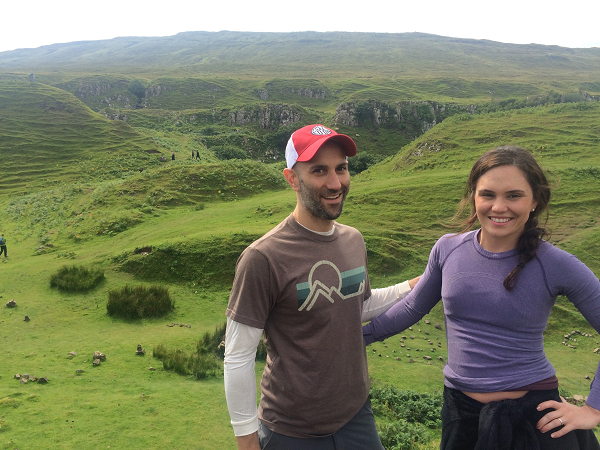Take extra precautions during the COVID-19 pandemic and flu season.
With the spread of the new coronavirus that causes COVID-19 and the start of flu season, it's important more than ever to be aware of Asthma Peak Week and the September Asthma Epidemic. Keep your asthma under control, avoid your triggers, and take precautions to avoid catching COVID-19, the flu and other respiratory infections.
Peter DeMarco of Boston, Massachusetts, lost his wife, Laura Levis, to asthma during Asthma Peak Week in 2016. In the essay below, Peter shares Laura's story, as well as some facts about Asthma Peak Week. If you have asthma, taking precautions can help prevent asthma episodes, attacks and hospitalizations in September.
There was no way for Laura to know that her life would end so suddenly that day in September. She’d gone to a concert a few nights before with friends, things were busy at her new job at Harvard, and she’d just pumped some serious iron at the gym. Her severe asthma attack came on so suddenly, and randomly, it seemed.
But that day – September 16 – was in fact not so random. And if Laura or I had been in possession of one small but important piece of information when her attack struck three years ago, she might still be alive.
There’s one week each year that traditionally sees the most asthma attacks in country, asthma doctors say, and it comes like clockwork every third week in September. It’s called Asthma Peak Week, the very same week that Laura succumbed to her attack.

According to the Asthma and Allergy Foundation of America (AAFA), asthma attacks spike throughout September because it’s high ragweed season, with ragweed pollen from 17 different species of the wild, green plant filling the air. Those allergic to ragweed begin sneezing and coughing – common hay fever. But ragweed can also trigger asthma attacks, like the fatal one Laura had.
September’s also a critical month because children returning to school are exposed to viruses, particularly rhinovirus, and other asthma triggers.
The third week in September is when these elements usually reach a crescendo. “It’s a perfect storm, so to speak,” says Dr. Sumita Khatri, a national asthma expert with the Cleveland Clinic and medical advisor for AAFA.
The problem is, I don’t believe many people with asthma know about Peak Week. Laura and I certainly didn’t.
What happened to Laura should never have happened to anyone: in the midst of a severe attack, she walked to CHA Somerville Hospital, only to find the door outside the emergency room locked. It was before dawn and she was alone, so she called 911 for help. Due to a shocking series of systematic and individual failures, that help never came. I wrote about Laura’s death first in the New York Times, then last fall in “Losing Laura” for the Boston Globe Magazine, sharing her story to promote change so that no one else will again suffer as she did.
Laura didn’t die just because she had an asthma attack. But in the end asthma is what took her life, much as it claims some 3,600 lives nationally each year – 10 lives each day. Had Laura known about the increased danger of suffering an attack during Peak Week, would she have taken different precautions that morning, I am left to wonder?
Would she have treated the first sign of her attack with more urgency? Would she have called me or someone else for help, instead of heading to the hospital on her own?
Asthma affects more than 25 million Americans – 1 in every 13 people – according to the Centers for Disease Control and Prevention. Everyone knows someone with asthma, and more than likely, you know several people. It’s important for them to know about Peak Week, how they need to be that much more vigilant about carrying inhalers and making sure their home nebulizers are refilled. It’s almost here, after all.
Nothing is within your control until your asthma is back under control, so when an attack strikes, never be alone. Always tell someone. Laura’s story proves this more than anything. Maybe that person will end up driving you to the hospital; maybe they'll just calm you down, as asthma intensifies when one starts to panic. I hope you share this message as well with the people you love who have asthma.
Through the Asthma and Allergy Foundation of America I’ve created a public service video to raise awareness this September. It can be found here on this website and on YouTube if you search for #10TooMany. If you watch it, you will see me cry, as I have cried a thousand times these past three years for Laura. Her death, on this third anniversary, is as painful as ever for me.
There is no replacing the people you love in life – no replacing their laugh, their smile, their touch, their kiss. But there is remembering. So please remember Asthma Peak Week. Remember Laura Beth Levis, and her story. Help, just maybe, save someone else’s life by spreading the word.
Because I know Laura would really want that.
If you have asthma, you can reduce your risk of having asthma symptoms during Asthma Peak Week by knowing the early warning signs of an asthma episode or attack. Carry your quick-relief inhaler everywhere. And at the first sign of symptoms, follow your Asthma Action Plan. And if you start having emergency symptoms, get help right away.
If you have asthma, you don't have to manage it alone. Join our online community for support from others who also have asthma. You can also learn more about managing your condition and take action on research or policy issues that can help save lives and improve the quality of life for people affected by asthma.


Comments (3)